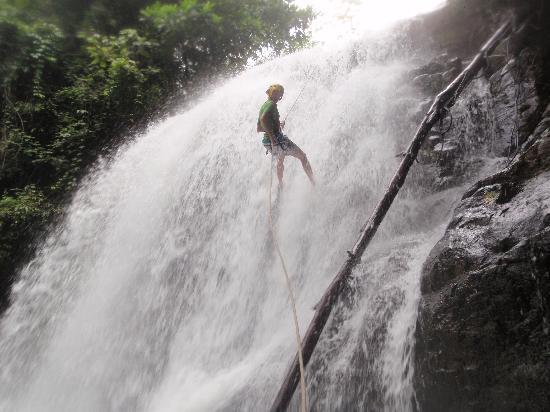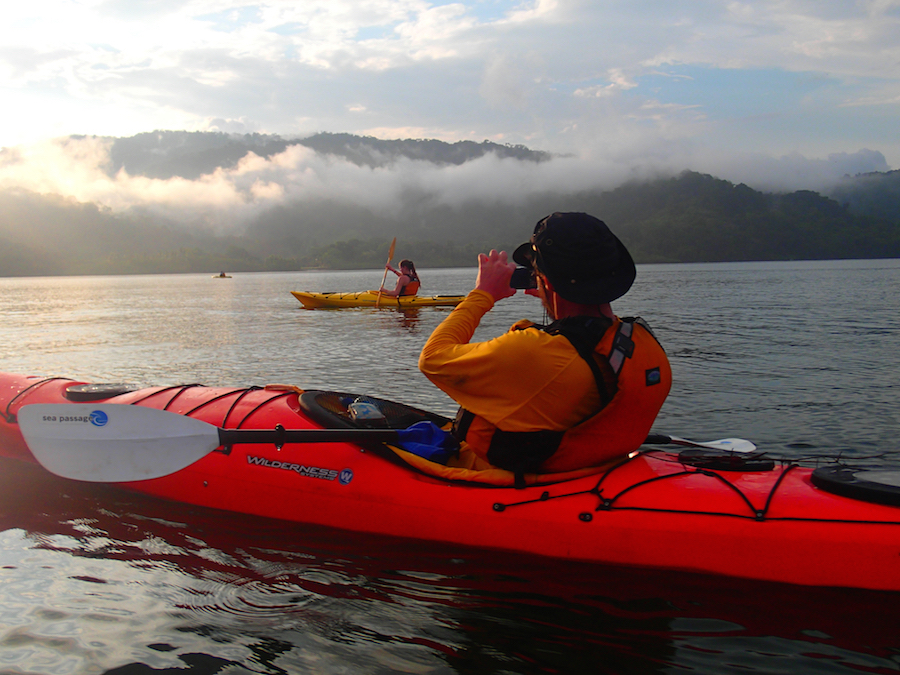Costa Rica Travel – From canyoning to sea kayaking, Costa Rica offers a playground for those seeking adrenaline-pumping activities
 Costa Rica’s diverse natural landscapes and terrain set the stage for coast to coast, action-packed adventures. Thanks to the country’s compact size, travelers looking for extreme adventures can participate in any and all adventures they wish without stressing over not having enough time to go from one activity to the next. As home to 5 percent of the world’s biodiversity, Costa Rica offers unforgettable experiences for travelers seeking to become one with nature.
Costa Rica’s diverse natural landscapes and terrain set the stage for coast to coast, action-packed adventures. Thanks to the country’s compact size, travelers looking for extreme adventures can participate in any and all adventures they wish without stressing over not having enough time to go from one activity to the next. As home to 5 percent of the world’s biodiversity, Costa Rica offers unforgettable experiences for travelers seeking to become one with nature.
The following are the four must-do extreme adventures in Costa Rica:
Canyoning – Canyoning in Costa Rica takes place in the areas of Turrialba, San Ramon, Miramar, La Fortuna and Rincon de la Vieja. Performed in small groups of up to 12 people accompanied by a guide, the activity includes walking, hiking, climbing and rappelling any or all of the six canyons available. This is a unique Costa Rican experience because the country’s tropical canyons and climate provide travelers the opportunity to explore landscapes with lush vegetation and breathtaking views of waterfalls.
Mountain Biking – With miles and miles of rocky trails and tough terrains, Costa Rica is perfect for all kinds of two-wheeled fun. The country’s most demanding routes take various days, allowing travelers to cross the country. The average length of a mountain biking trip is five to eight, or even 10 days. Travelers can choose from professional routes such as “La Ruta de los Conquistadores,” which lasts three days, or opt for a shorter route that combines mountain biking with walking, rafting and kayaking. If seeking to go completely off-road, travelers can also choose a route that does not touch pavement at any point, such as the one at Rincon de la Vieja, comprised of 24 to 31 miles of waterfalls and downhill paths.
Trekking – With mountainous terrain and unspoiled rainforests, trekking through Costa Rica’s rainforests is a one-of-a-kind experience. Unlike hiking, trekking is a lengthier activity, with the average route lasting three days. There are three popular trekking routes in Costa Rica. The Savegre route, which consist of various trails connected through agricultural towns that offer facilities and activities, allows visitors to choose the points they want to explore. For the Kamuk route, comprised of five days of walking for a total of a week-long trip, travelers have to carry everything with them, including their own tent and food, as the route is off the beaten track. Another option for travelers interested in trekking is the Chirripo route, in Costa Rica’s tallest hill, but only after reaching out to the national park for a permit.
Sea Kayaking – For travelers interested in sea kayak camping, the four-day route at Golfo Dulce, where different species of whales and dolphins give birth and nurse their young throughout the year, is a must. The trip begins at Puerto Jimenez and leads travelers up the coast at a rate of 12 miles per day. On the second day of the trip, travelers cross from one side of the gulf to the other. Travelers can take a rest at the camp site in Piedras Blancas National Park, at the opposite side of Osa Peninsula. For this trip, travelers have to take all essentials in the kayak with them, including their tent. Another popular route for sea kayak camping is the beginning at Puerto Viejo de Sarapiqui, through Rio San Juan and ending at Barra del Colorado Wildlife Refuge.
And so much more…
Costa Rica’s plethora of extreme adventures also includes skydiving in locations such as Manuel Antonio, Puntaneras and Esterillos, as well as scuba diving in Isla del Caño and Isla Catalina, where it’s possible for travelers to see giant devil rays. Travelers interested in surfing may also choose to visit Costa Rica for its massive waves. Some of Costa Rica’s most popular beaches include Jaco, the home of the 2016 International Surfing Association World Surfing Games, Playa Naranjo and Pavones.
For more information on Costa Rica, visit www.visitcostarica.com
About Costa RicaCosta Rica is located in Central America between Nicaragua to the north and Panama to the south; it is bordered on the east by the Caribbean Sea and the west by the Pacific Ocean. With an abundance of unique wildlife, landscapes and climates this small country proudly shelters approximately five percent of the known biodiversity in the world. In order to protect and preserve its wealth of natural resources, Costa Rica has become a global leader in sustainable practices with protected areas comprising 26 percent of its land mass. With a peaceful spirit, emphasis on education and an economy based on tourism, technology and exportation, Costa Rica offers one of the highest standards of living in Latin America. Visitors to Costa Rica enjoy a highly organized tourism infrastructure among a tropical paradise of lush rainforests, mystical volcanoes and cloud forests and beaches that meet mountains filled with monkeys and macaws. Offering a broad terrain of activities and accommodations, visitors to Costa Rica will find a range of hotel options ranging from small beachside bed & breakfasts to authentic intimate boutique mountain lodges to major international business hotel brands and everything in between. Costa Rica’s accommodations offer something appealing for everyone’s desires. The phrase “Pura Vida” can be heard echoing throughout Costa Rica from coast to coast. Used as a greeting or expression of happiness, the phrase literally translates to “pure life,” however its true meaning is “full of life,” which accurately describes the adventure and wonder that await visitors.
About Instituto Costarricense de Turismo (ICT)Established in 1955, the Costa Rica Tourism Board spearheads the vital task of regulating and promoting Costa Rica’s extensive of tourism offerings. The ICT and its partners in the private sector work tirelessly to garner recognition, standardize practices, provide insightful research data and foster cultural development for the country’s coast to coast one-of-a-kind tourism products and resources.
SOURCE Costa Rica Tourism Board From Market Watch

